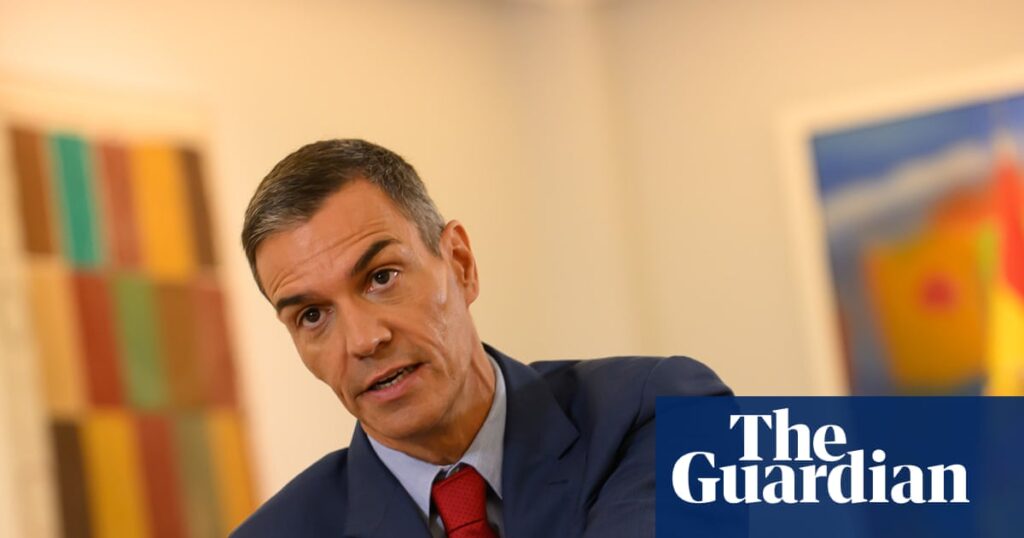Against the scale of civilian slaughter, famine and mounting evidence of war crimes in Gaza, Europe’s political leaders have been passive to the point of complicity, argue many human rights advocates and even former high-ranking EU officials.
Now the Spanish prime minister has come close to acknowledging as much. In an interview with the Guardian, Pedro Sánchez characterised Europe’s refusal to act against the Israeli government as a moral and political failure that would damage its global credibility for years to come. Sánchez warned that Europe’s response to “one of the darkest episodes of the 21st century” has been “a failure, absolutely”.
Sánchez became the first senior EU leader to accuse Israel of genocide in July – other governments, including the UK, argue that only international courts can make such a judgment. In today’s interview, Sánchez admitted Europe is operating double standards in how it responds to Ukraine and Israel’s assault on the Palestinian territory.
The comments reflect increasing impatience in Madrid with the deep divisions that have so far resulted in the EU’s near-paralysis on Gaza – and a sense among many voters that all EU governments are ignoring the political decisions that have led to this humanitarian catastrophe. Spain’s leader wants the suspension of the strategic partnership the EU has with Israel and said that Spain would push Europe to do more, including punishing Israel financially.
The EU certainly has strong economic levers it could pull, being Israel’s biggest trading partner. An internal review in July could have triggered a suspension of some of the trade concessions Israel enjoys under its “association agreement” with the EU. But Israel’s closest EU allies – Germany, Hungary and the Czech Republic – oppose sanctions. The growing public pressure potentially strengthens Spain’s hand in the EU debate, although as the Patrick Wintour points out, in his analysis, Sánchez is limited to trying to persuade more EU states until there is a majority for suspension.
In the meantime, a flotilla set off from Barcelona on Sunday, carrying activists including Greta Thunberg, seeking, organisers say, to non-violently “break the illegal siege of Gaza” and deliver food and supplies to starving Palestinians.
More governments are also taking symbolic steps. On Tuesday, Belgium added itself to the list of countries that have or will soon recognise Palestinian sovereignty. France and the UK will follow suit this month. And in Ireland, campaigners claimed victory on Monday after Israel moved approval for the issuance of its war bonds – which raise cash on international markets for its campaign in Gaza – from the Irish central bank to Luxembourg.
But, argued Irish author Naoise Dolan writing about her decision to join the flotilla, even European governments that vaunt their solidarity with Palestinians “aid and abet” Israel’s war in other ways. She highlighted the impact that video images such as those of a person being beaten up by German police at a Gaza protest in Berlin last week would have on public opinion.
In Sánchez’s interview, the socialist prime minister also “showed a willingness to frame a values-based foreign policy”, wrote Patrick Wintour, criticising Donald Trump for the “shocking reality” that the US is now dismantling the rules-based international order it helped to create from the ruins of the second world war.
Russia’s ‘undeniable interference’
It could be the stuff of a cold war spy novel: the presiding head of Europe’s core political community is touring the bloc’s eastern borders when the radar system of her aircraft is jammed in Bulgarian airspace. The mysterious attack shuts down the plane’s GPS navigation system, forcing the pilots to rely on paper maps to land.
after newsletter promotion
But this is not fiction: it happened to Ursula von der Leyen last Sunday. The jet carrying the president of the EU commission from Warsaw to Plovdiv in Bulgaria landed safely after what may have been a tense hour in the cockpit. But the incident has heightened fears that as war rages in Ukraine, Russia is stepping up a campaign of hybrid warfare against its European allies.
The Kremlin denied involvement, telling the Financial Times, which broke the story, its information was “incorrect”. EU officials said the disruption was “undeniable interference” and is being investigated as a suspected Russian sabotage operation. Nato secretary general Mark Rutte said Nato is “working day and night to counter this, to prevent this.”
Incidents of GPS jamming and “spoofing”, an electronic warfare tactic that causes incorrect navigation information to be displayed, have increased since 2022, and escalated even more sharply in the past year, particularly in the Baltic states.
Even if destabilising the EU’s frontline states is very much on Putin’s radar, why would von der Leyen be a target? The commission chief has pursued a far more geopolitical agenda than her predecessors and is a robust critic of Putin. Hours before the aircraft incident, on the border between Poland and Belarus, she called the Russian president a “predator”, following missile strikes on Kyiv that killed at least 23 people and damaged EU offices.
Under her stewardship the EU has also become more militarised: her four-day tour was about visiting weapons factories and discussing how to build the EU’s defence infrastructure to be able to confront Russia.
This latest incident is further evidence, as many in Kyiv including Olga Chyzh argue, that Russia is uninterested in peace. It also shows that Putin’s war on Ukraine doesn’t stop at Ukraine’s borders.
To receive the complete version of This Is Europe in your inbox every Wednesday, please subscribe here.

